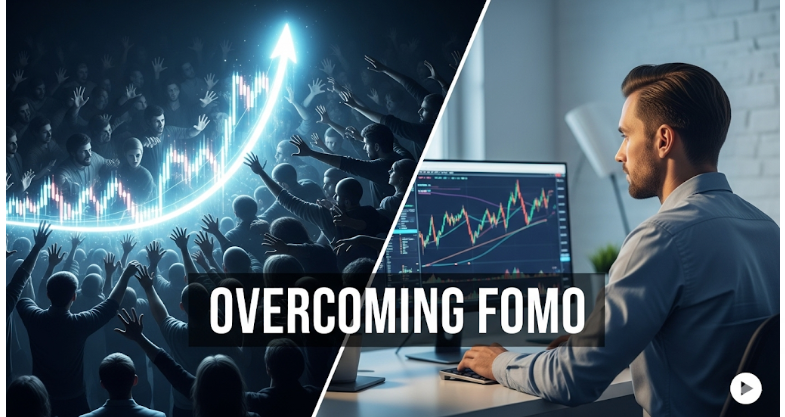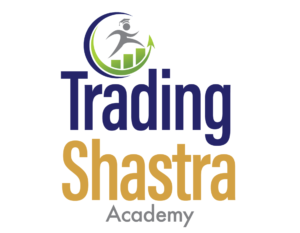Overcoming FOMO in Trading | 2025 Psychology Guide

Overcoming FOMO in trading is one of the biggest challenges for retail traders in India. Fear of missing out leads to impulsive trades, chasing rallies, and ignoring risk. This guide by Trading Shastra explains why FOMO happens, its impact, and proven psychology hacks to stay disciplined in 2025’s stock market.
What is FOMO in Trading?
FOMO (Fear of Missing Out) in trading refers to the urge to jump into trades because everyone else seems to be making money. Traders often buy stocks late in a rally or chase IPOs, not because of analysis but due to emotional pressure.
Investopedia defines it as a behavioral bias where traders act irrationally under social and market influence.
Why Does FOMO Happen?
FOMO isn’t random — it’s triggered by psychological and market factors:
Market Rallies: Seeing Nifty 50 or Sensex surge creates excitement.
Social Media Hype: Twitter/Telegram groups amplify noise.
Herd Mentality: If peers are buying, traders don’t want to be left behind.
Recent Successes: After one winning trade, traders feel they can’t miss the next.
Impact of FOMO on Traders
The impact of FOMO in trading can be destructive:
Overtrading: Entering too many trades without analysis.
Chasing Prices: Buying late into rallies at inflated prices.
Ignoring Risk: Skipping stop-loss or position sizing.
Emotional Burnout: Fear, greed, and regret cycle.
Example: During the 2021 IPO rush (Zomato, Nykaa), many retail traders bought at listing highs and saw sharp declines later.
Examples in Indian Markets
Bull Runs in IT (2020-21): Traders chased Infosys and TCS after they doubled, entering late.
Covid Pharma Rally: Pharma index surged but many bought near peaks due to FOMO.
IPO Mania: Retail frenzy during LIC IPO saw many entering without understanding fundamentals.
👉 These case studies show why overcoming FOMO in trading is crucial.
Steps for Overcoming FOMO in Trading
Stick to a Trading Plan
Predetermine entry, exit, and stop-loss. If a stock doesn’t meet criteria, skip it.Use Risk Management
Position sizing and stop-loss help control emotional mistakes.Maintain a Trading Journal
Track decisions. A journal highlights past FOMO mistakes. (See how)Avoid Noise
Don’t blindly follow social media “tips.” Filter credible sources like NSE or SEBI.Routine & Checklists
Build habits: pre-market prep, rule-based trading, and post-trade reviews.
The 3R Framework: Rules – Routine – Review
At Trading Shastra, we teach traders to fight FOMO with the 3R psychology model:
Rules: Define strict entry/exit setups.
Routine: Daily discipline in scanning, journaling, and execution.
Review: Weekly performance reviews to track emotional mistakes.
Why Mentorship Matters in Overcoming FOMO
Self-learning often fails because emotions dominate. Mentorship helps by:
Real-time feedback during market hours.
Learning from experts’ psychology in tough moments.
Group accountability (seeing disciplined peers).
Why Trading Shastra Focuses on Psychology
Unlike academies that only teach technicals, Trading Shastra Academy integrates trading psychology into every course.
Live FOMO Control Training: Students face simulated rallies and learn discipline.
Funded Capital Programs: With ₹10–50 Lakh support, discipline is non-negotiable.
100% Loss Coverage: Traders learn without fear.
Mythological Learning: Lessons from Mahabharata/Ramayana on patience and discipline.
👉 Already part of our Best Stock Market Courses in Noida.
FAQs
Q1: What is FOMO in trading?
A: Fear of missing out; traders enter trades emotionally, not logically.
Q2: Why does FOMO happen?
A: Market rallies, herd mentality, and social media hype trigger it.
Q3: How does FOMO affect traders?
A: It causes overtrading, chasing, and heavy losses.
Q4: How to avoid FOMO in trading?
A: Follow a trading plan, use stop-loss, and journal trades.
Q5: Is FOMO common in beginners?
A: Yes, beginners are more vulnerable due to lack of experience.
Q6: Can FOMO cause losses?
A: Yes, many lose by entering late in rallies or IPOs.
Q7: What are hacks to overcome FOMO?
A: Rules, checklists, journaling, and mentorship.
Q8: How do Indian traders face FOMO?
A: During IPOs and bull runs, retail traders rush to buy late.
Q9: Does journaling help reduce FOMO?
A: Yes, it exposes emotional trading patterns.
Q10: Can mentorship control FOMO?
A: Yes, structured mentorship reduces impulsive behavior.
See Our More Blogs
Institute Info
Trading Shastra Academy
B-11, Sector 2, Noida – 201301
Website: www.tradingshastra.com
Email: info@tradingshastra.com
Phone: +91 9717333285
Disclaimer
This blog is for educational purposes only. Stock market investments are subject to risks. Please do thorough research before investing.
